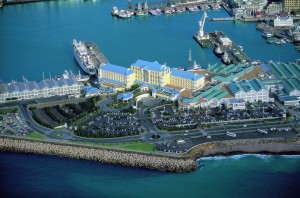Sun < International Targets R30 million in Energy Savings at Hotels and Casinos
Sun International is targeting at least R30 million in energy savings at its casinos and hotels by investing in energy-saving interventions ranging from the insulation of geysers and pipes to adopting energy efficient lighting and coaching staff to conserve energy.
 The targeted savings were identified by an energy efficiency audit of the leisure and gaming company’s facilities funded by the National Business Initiative’s Private Sector Energy Efficiency (PSEE) programme. The audit identified energy savings of as much as 61% of current energy costs at four of Sun International’s premier properties: The Golden Valley Casino, The Table Bay Hotel; The Carousel; and The Windmill Casino and Entertainment Centre.
The targeted savings were identified by an energy efficiency audit of the leisure and gaming company’s facilities funded by the National Business Initiative’s Private Sector Energy Efficiency (PSEE) programme. The audit identified energy savings of as much as 61% of current energy costs at four of Sun International’s premier properties: The Golden Valley Casino, The Table Bay Hotel; The Carousel; and The Windmill Casino and Entertainment Centre.
“Boosting energy efficiency offers not just an opportunity for Sun International to lower its energy costs but is also a chance for the company to do its bit to alleviate pressure on South Africa’s power grid,” says Michael Farr, Group GM Brand and Communications of Sun International. “All companies in South Africa need to do their bit to improve their energy efficiency efforts as part of the nationwide campaign to reduce waste and maximise the amount of power available to the wider economy.”
The PSEE is a bi-lateral initiative between South Africa and the UK which aims to improve energy efficiency in commercial and industrial companies in South Africa by identifying and implementing energy saving measures. Regulated energy price increases in South Africa are expected to raise electricity costs for South African businesses by 47% over the five year period running from 1 April 2013 to 31 March 2018.
The PSEE audit showed that Sun International’s Carousel Casino and Entertainment World in the North-West Province could slash energy costs by a massive 61% resulting in an annual saving of more than R7.5 million, simply by adopting new energy conservation measures. The resort’s total energy spend in 2013 was R14.57 million, of which 97% or R13.9 million was for electricity.
Similarly, The Golden Valley in the Western Cape town of Worcester could slash its R3.78 million energy bill by as much as 40%, while The Windmill Casino and Entertainment Centre just outside Bloemfontein has the capacity to reduce its energy bill by 29% for a saving of more than R1.2 million annually.
While casinos typically have higher electricity costs due to the wide range of gaming equipment that they utilise, Sun International is also honing in on the energy use of its hotel facilities.
The Table Bay Hotel, built in 1997 on the popular Victoria and Alfred Waterfront close to the Cape Town’s city centre, could cut its R7 million annual energy bill by 19%, according to the PSEE. The hotel employs 490 staff and the average monthly energy consumption is 673 000 kilowatt hours (kWh), at a cost of R522 000 depending on occupancy levels. By investing R887 000 in energy efficiency initiatives, the hotel could cut more than 860 000 kWh from its annual consumption and save more than R1.3 million in energy costs. The investment could be paid back in just over eight months, according to the PSEE.
“Energy efficiency clearly has tangible benefits for us as a company and we are looking at ways to replicate these energy savings measures at all of our operations,” says Farr. “A lot of it comes down to education of both staff and guests. Something as simple as encouraging guests to wash towels only when necessary can result in massive savings in the form of both water and electricity.”